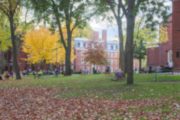
“Many social and personality psychologists admit that they would discriminate against openly conservative colleagues,” according to a study to be published next month by two psychologists, the Washington Times reported last week. The psychologists who were questioned in the study admitted that they would openly attempt to keep conservative colleagues from teaching at a university or publishing papers in peer-reviewed journals.
Survey Results
Yoel Inbar and Joris Lammers, of the University of Tilburg in Holland, studied “academics and scholars in social psychology,” and found that they aren’t always open-minded. “In decisions ranging from paper reviews to hiring, many social and personality psychologists admit that they would discriminate against openly conservative colleagues,” the Times reported, quoting the two professors. They will published their findings in Perspectives on Psychological Science, a professional journal for psychologists.
According to the Times, “This finding surprised the researchers.”
The survey questions “were so blatant that I thought we’d get a much lower rate of agreement,” Inbar said. “Usually you have to be pretty tricky to get people to say they’d discriminate against minorities.”
One question, according to the researchers, “asked whether, in choosing between two equally qualified job candidates for one job opening, they would be inclined to vote for the more liberal candidate (i.e., over the conservative).”
More than a third of the respondents said they would discriminate against the conservative candidate. One respondent wrote in that if department members “could figure out who was a conservative, they would be sure not to hire them.”
The two also found that the farther to the left an academic is, the more willing he would be to discriminate against conservatives. Yet they “paradoxcially … assum[e] that conservatives do not face a hostile climate in the academy.”
“Mr. Inbar, who volunteered for the Obama campaign in 2008, cautions that the finding reflects only what respondents said they would do — not necessarily what they actually would do in real life,” the Times reported. It continued:
To Massimo Pigliucci, chairman of the philosophy department at the City University of New York-Lehman College, the problem is not that conservatives face discrimination; it’s that any hint of political bias, whether conservative or liberal, necessarily flouts the standards of objectivity to which scholarship must adhere.
“It is to be expected that people would reject papers and grant proposals that smacked of clear ideological bias,” he says. Mr. Inbar and Mr. Lammers, he says, should have examined the extent of bias against liberal-leaning papers and grant proposals. If the degree of bias against liberals and conservatives is similar, maybe the data on discrimination against conservatives would not be so alarming after all.
A conservative professor told the Times that being a conservative is just not acceptable in the university faculty lounge.
Dutch Study Parallels Others
The study from Inbar and Lemmer, the Times noted, comports with the work of Jonathan Haidt, a social psychologist at New York University’s Stern School of Business who studies the “foundations of morality.” Haidt was a professor at the University of Virginia for 16 years. While there, he conducted an interesting experiment, the New York Times reported in February 2011.
He attended a meeting of the Society for Personality and Social Psychology, the paper said, “where psychologists discuss their research on racial prejudice, homophobia, sexism, stereotype threat and unconscious bias against minorities. But the most talked-about speech at this year’s meeting, which ended Jan. 30, involved a new ‘outgroup.’”
According to the Times, Haidt “polled his audience at the San Antonio Convention Center, starting by asking how many considered themselves politically liberal.” About 80 percent of the hands shot up. But “when he asked for centrists and libertarians, he spotted fewer than three dozen hands. And then, when he asked for conservatives, he counted a grand total of three.”
“That is a statistically impossible lack of diversity,” Haidt noted, given that polls that show 40 percent of Americans are conservative and a miniscule 20 percent are liberal, the Times reported.
“Dr. Haidt argued that social psychologists are a ‘tribal-moral community’ united by ‘sacred values’ that hinder research and damage their credibility — and blind them to the hostile climate they’ve created for non-liberals,” the Times said.
“Anywhere in the world that social psychologists see women or minorities underrepresented by a factor of two or three, our minds jump to discrimination as the explanation,” said Dr. Haidt, who called himself a longtime liberal turned centrist. “But when we find out that conservatives are underrepresented among us by a factor of more than 100, suddenly everyone finds it quite easy to generate alternate explanations.”
Haidt found that “non-liberal” students in social psychology learn to keep quiet in class and feel much like “closeted gay students in the 1980s,” the Times reported.
The Washington Times and New York Times cited studies that show how American universities are controlled by leftist elites. As Haidt says, the numbers appear to show they are discriminating against conservatives in hiring.
“The politics of the professoriate has been studied by the economists Christopher Cardiff and Daniel Klein and the sociologists Neil Gross and Solon Simmons,” the New York Times continued. “They’ve independently found that Democrats typically outnumber Republicans at elite universities by at least six to one among the general faculty, and by higher ratios in the humanities and social sciences.”
Another study showed that “nearly 80 percent of psychology professors are Democrats, outnumbering Republicans by nearly 12 to 1,” the Times noted, adding:
The fields of psychology, sociology and anthropology have long attracted liberals, but they became more exclusive after the 1960s, according to Dr. Haidt. “The fight for civil rights and against racism became the sacred cause unifying the left throughout American society, and within the academy,” he said, arguing that this shared morality both “binds and blinds.”
“If a group circles around sacred values, they will evolve into a tribal-moral community,” he said. “They’ll embrace science whenever it supports their sacred values, but they’ll ditch it or distort it as soon as it threatens a sacred value.”
Conservatives and “Disgust”
Inbar and Haidt make something of an avocation of studying conservatives. With two other academics, they published a paper in 2011 that showed that the more readily a person feels “disgust,” the more conservative he is.
“Not only does the momentary experience of disgust shift judgments in a politically conservative direction, individuals who are more readily disgusted reflect this in their stable moral and political attitudes,” their paper reported. It continued:
Individuals who report being easily disgusted are more tolerant of social inequality and score higher on measures of authoritarianism … have more conservative attitudes toward sex … and hold more negative implicit attitudes toward homosexuality…. Consistent with the experimental work described above, such individuals are also more likely to identify as politically conservative.



